Get posts by email
Our Homeschool Methods
September 24, 2013
Last fall, in the height of my homeschool blog-o-rama I promised this post. I'm currently in this fall's homeschool blog-o-rama. So what better time to finally follow through.
After my recent post about our curriculum, it seems especially appropriate to follow up with a post like this one to explain how we live and learn a course of study, our curriculum.
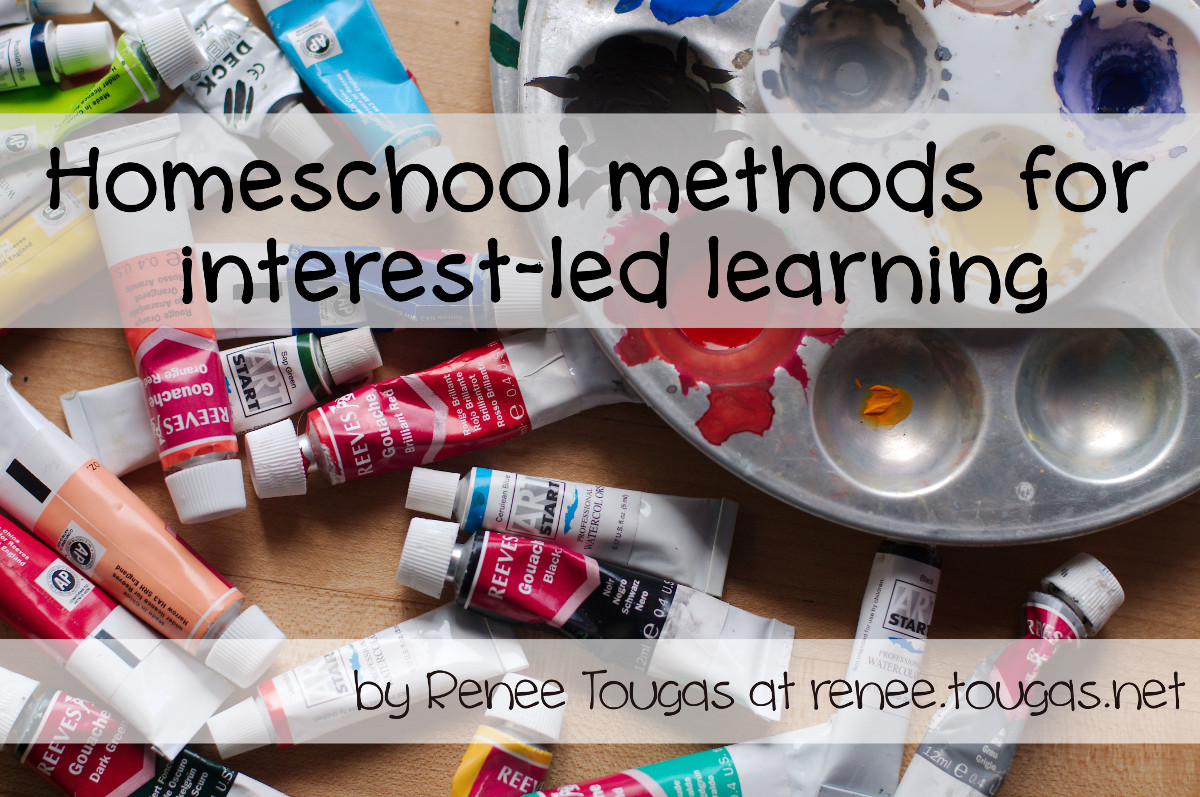
Knowing that we are interest-led learners, when you read a post like that one, or this one, or this one, you might naturally wonder how does that all work exactly?
You may wonder if my kids are "interested", completely on their own accord, in everything you see presented. And if not, how do I inspire them? Or do I?
Here's the thing with our curriculum: It is definitely interest-driven but it is not all child-driven, at least not in its initial stages. There are subjects and ideas that I present to my children that they may not have expressed any interest in learning simply because they didn't know those ideas even existed.
How can you express an interest in something you've never heard about?
Setting a banquet table of many tasty morsels is the best metaphor I can think of for our curriculum.
Some of the dishes are my kids' favorites, things they could eat every single day, and they do! Others are my favorites, things I love and am full of enthusiasm to share, "oh you must try this!"
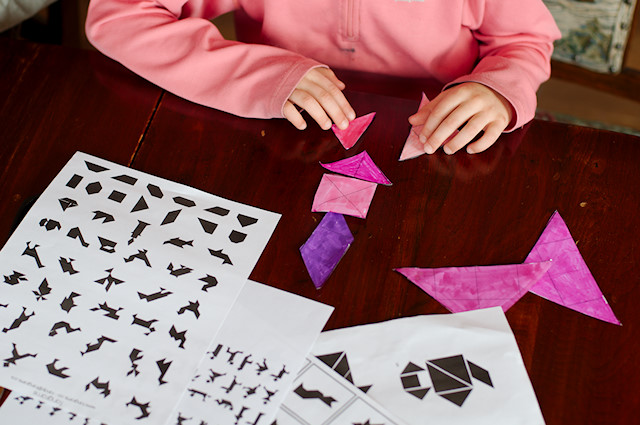
Other dishes are completely new to both parties and I want us to have a taste to see if we want to eat more. Some are dishes we've tried once but didn't like so much the first time around. But this time we're trying them a little differently, different spices and such, to see if we like this variation better.
There's a lot of dishes on the table and there's no obligation to eat our way through all of them.
In this way, a lot of the ideas I share in my curriculum posts are things I want my kids to be exposed to and learn about, to some degree.
My job as as my kids' parent, teacher, mentor, and facilitator is to motivate and inspire interest in these subjects. And if these subjects, or the resources I've pulled together to study them, can't hold the kids' interest (or mine) - we don't continue down that track.
Just to be clear: I am referring specifically to my elementary and middle years students. Our high schooler spreads her own feast and is free to join our group learning table anytime her own "feasting" schedule and appetite allows.
The question then that I really want to address in this post is this:
How do we teach what's spread on this table?
How do we deliver a parent-designed curriculum in an interest-led, freedom based learning environment?
In other words, what are our pedagogical methods and means.
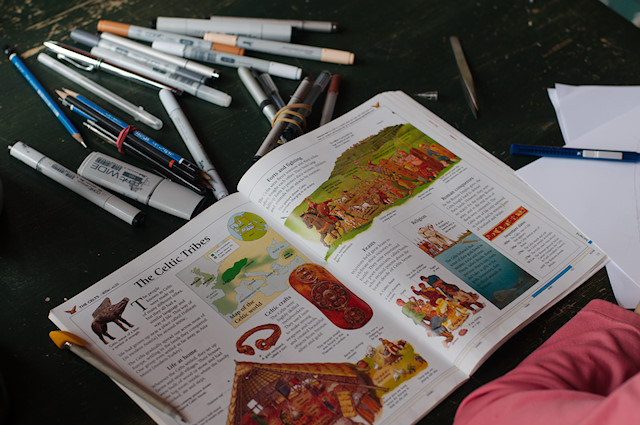
Learning environment basics.
Whether it's explicit or not, every learning environment has a few main parts. These are:
- philosophy
- curriculum
- methods
There are other pieces of course, but these are the biggies, and most of the other pieces actually belong to one of these categories.
Philosophy
Your educational philosophy is based on your values. In an institutional school setting the values that form the basis of the educational philosophy for that system usually reflect the values of society-at-large. Or rather, the values of powerful people and groups trying to re-engineer society-at-large.
On a smaller scale, the educational philosophy of a private religious school, for example, will reflect the values of a segment of society.
An educational philosophy will include learning objectives based on those values.
For example, our philosophy of education includes the belief that learning is a lifetime endeavor, never ending till we die, allowing us to evolve and adapt to constant change - internally and externally.
Therefore, one of our homeschool objectives is that our children will enter adulthood with a personal commitment to their own learning and a strong sense of self-directed life goals.
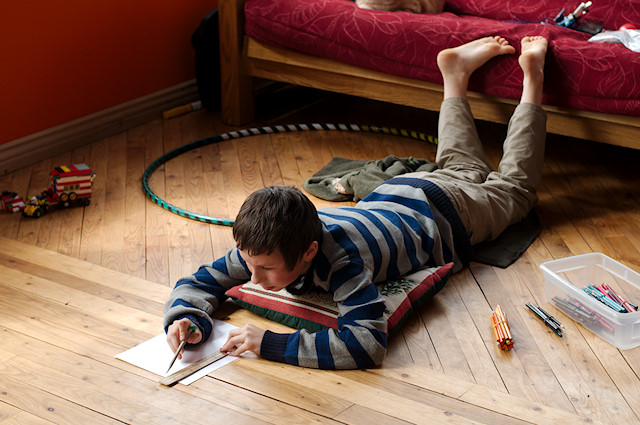
This doesn't mean they'll necessarily know "what they want to do when they grow up". It means they will feel in charge of their own learning and know, from experience, how to identify their personal learning objectives and find the resources and means to move forward in those. They will be self-directed learners.
Certain educational means (methods) will support this belief (our philosophy) better than others. This is one of the reasons why we don't grade our children. The means doesn't support the end. We feel the method doesn't support the objective.
In our home, our philosophy of education is based on our family values which arise from: our faith, our past experiences and education, who we are as people (the way we're wired), the ideals we aim for, the world we are trying to create and the change we are trying to enact in the world, and our hands-on experience with our growing children. The actual work of raising, educating, and studying my own children has taught me more than I ever learned in university about how learning "works".
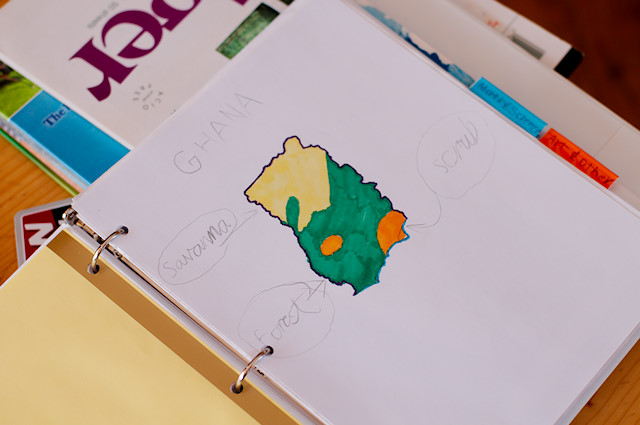
Curriculum
Curriculum comes out of those values. It is the course of study to meet your objectives. It is much bigger than the math program you use. It is the whole picture of what you are aiming to teach your children about the world and themselves, over the course of many years.
For example, one of our learning objectives is that our young adults will be equipped with the knowledge, skills, and habits to maintain their personal health and well being.
Whether or not they will carry those values into adulthood is not our responsibility. Our responsibility is to lay the foundation and teach what we know - the importance of good diet, exercise, rest, healthy relationships, a positive mental outlook, etc.
Our curriculum therefore includes learning to cook, daily exercise (and learning physical activities you can do all through life, not just as a part of a school team), developing good relationships with people, etc. The methods we use are varied but the important point here is that it's an objective of ours, so it's part of the curriculum.
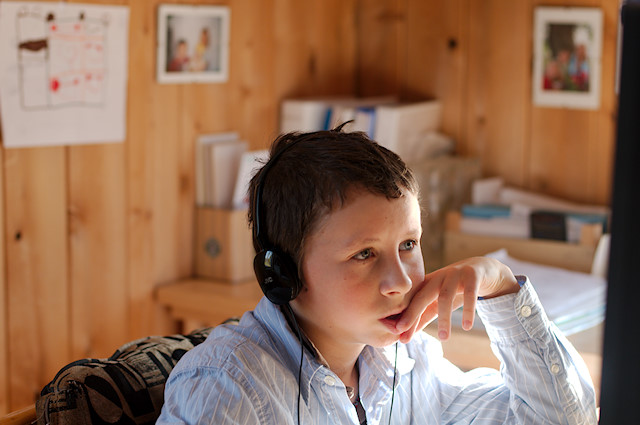
Methods
Methods are the means you use to teach, facilitate, and basically make the curriculum come alive, the way you make it happen.
A philosophy of education is an idea. A curriculum is an idea also. An idea, or ideas you want your children to internalize (learn). Methods are the actions; the means of putting those ideas into practice.
The question you have to ask yourself is, does this curriculum meet our objectives? And, do these methods best facilitate the delivery of that curriculum?
For example (a glaring one so you can clearly see what I'm talking about). Let's say one of your homeschool objectives is an appreciation for and a personal understanding of the natural world. Then nature study (or some variation of that) is a logical part of your curriculum.
The best means or method to fulfill that curriculum element would be to go outdoors and muck about, learning about the natural world through hands-on discovery and engagement vs. a coloring book about plants. Nothing wrong with a coloring book as a supplement activity, but it's a poor substitute for the real thing and is less likely to help you meet your objective if used alone.
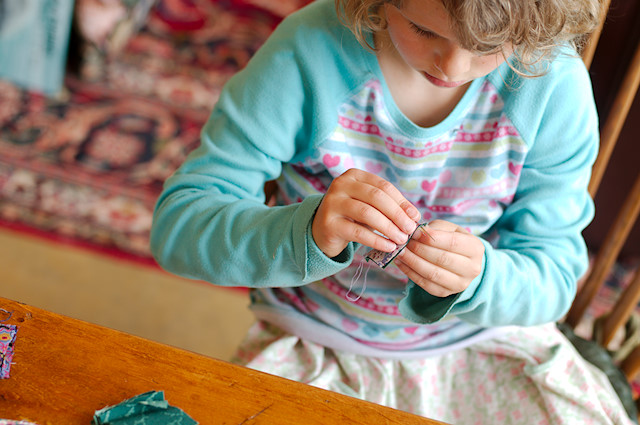
Show some respect to the unschoolers.
I'm kind of picky about definitions. I don't like it when people water down the meaning of something. I see this a lot with unschooling.
This is why I bristle so much when people say they are classical schoolers in the morning and unschoolers in the afternoons. Or parent-driven, textbook learners three hours of the day and unschoolers for the rest. (Oh please, show some respect to the real unschoolers.)
It seems like nowadays the true unschoolers have to designate themselves as radical unschoolers to separate themselves from all the riff-raff calling themselves that but living something different.
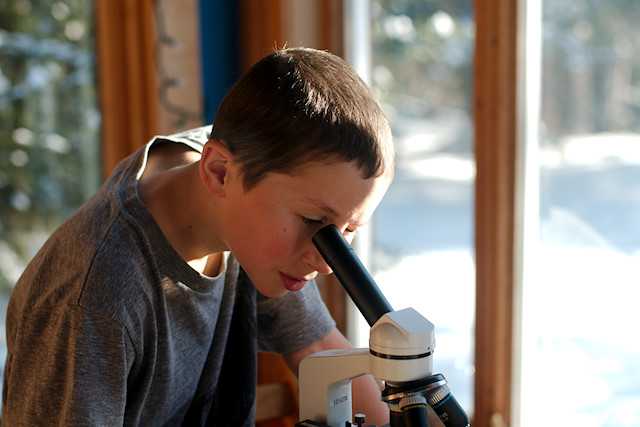
Unschooling is a philosophy of education, which in its truest form employs many methods.
So many people look at the method and label "unschooler" or "not unschooler".
Unschooling does not mean no lessons or textbooks, it means lessons and textbooks if the learner asks for and seeks those out. Which could even mean attending a brick-and-mortar school itself.
But as I understand it, in its truest form, unschooling has no authority-driven curriculum, except self-authority. The curriculum is the philosophy itself - to learn whatever the learner feels inclined to do, or not do.
I define unschooling in very radical terms because I want to preserve the meaning of the definition.
We are not unschoolers. People on the web have sometimes described me as an unschooler to which I raise my eyebrows. And I think, "oh so that's how they perceive our freedom based education."
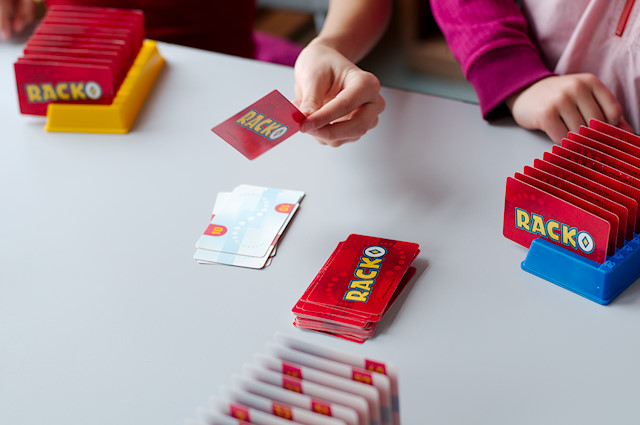
There are subjects I present and teach independent of my children's leading. My children would not have chosen to study physics this fall. They don't really even know the word "physics", though they are familiar with its principles through years of hands-on play. We are studying (and loving) physics. It is giving language to the years of observation and experience our kids have had in the natural world.
Most of our curriculum is determined by my children's interests but I also engage them in subjects of my choosing. My aim is to inspire them.
They have a lot of say about how we study those subjects, and even if we continue to study them - that's the freedom part. But I am definitely choosing, creating, and actively teaching a curriculum. (Even when the teaching doesn't look like "teaching" at all.)
I also design a curriculum for my learners based heavily on our family values with the explicit aim of transmitting those family values. That is not unschooling, in its radical form.
This is why I don't self-identify in the unschool camp. I am not open ended about where our homeschool is going.
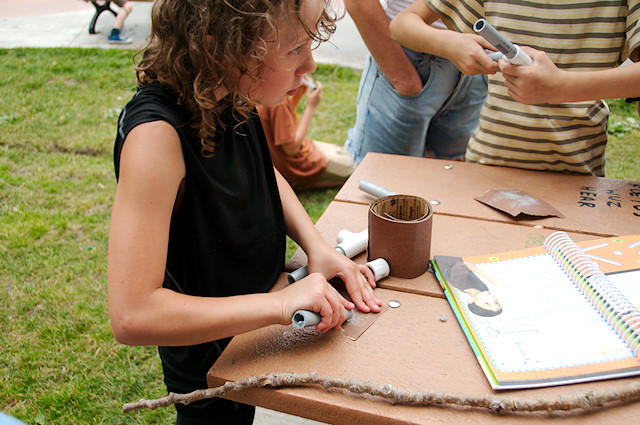
We have objectives. We have a parent-led home life and learning life. As parents we mark boundaries and we set up a definite structure. And then within those parameters there is a great deal of freedom for our children to choose their own course of learning and living. And that freedom increases as they grow and take on more personal responsibility.
This is not a criticism of unschooling. I respect that model and show that respect by no co-opting the definition for myself.
Perhaps trying to nail down definitions is futile anyway. "Homeschooling" does not describe what we do either. Since we don't "school" at home. And home is just one of the places we learn. Maybe non-institutional, non-standard, family-supported and interest-led self-learning is a more apt label. Homeschooling is just easier to say.
Our modus operandi ~ Our homeschool methods
Can you believe this was actually the point of this whole post - to share our homeschool methods? My goal was to explain how our curriculum actually plays out in real life.
A two thousand word introduction is long, even for me.
I've never actually written a methods list before. It's just something we do. So I may have missed something glaringly obvious in the list below. (Feel free to add your own ideas in the comments.)
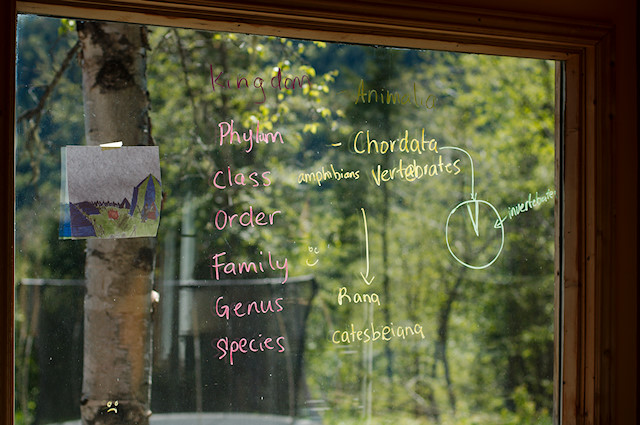
Here are the main methods we use in our homeschool:
- reading - for pure pleasure, reference, & research.
- experiments
- being outdoors (this is a method, a curriculum element, and a family value)
- making, building, and creating
- media - video, radio/podcasts
- social media - connecting with people
- games
- conversation & discussion
- communication - presentations, writing, etc.
- physical activity
- home life - cooking, finances, etc.
- play - deserves a whole book chapter itself
- friendships & community
- mentors
- lessons & classes
- travel & field trips
- projects
And this list grows as we progress through the years. Our early years methods list was simpler.
These methods are not mutually exclusive, standing on their own. We use them in conjunction with each other and often one method will include other means also. I think that's obvious.
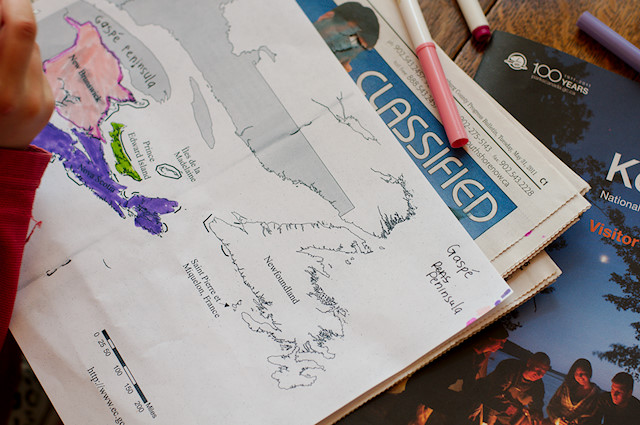
How does this play out?
I'll use some examples:
-
We teach math predominantly with lessons, play, games, home life, and conversations. I have always outsourced the lessons part to a math program. First Math-U-See, then Teaching Textbooks and now Khan Academy. Those lessons use a variety of learning preferences in their delivery - visual, aural, read/write and kinesthetic components depending on the level of study. Lots of kinesthetic stuff for younger ones.
-
We teach history predominantly with reading, media, conversations and discussions, community, projects, travel and field trips. We read stories about people in different periods of history. We watch movies and hear radio stories that serve as a springboard for study, causing us to ask questions and seek answers. We talk to people and mine our community for resources like museums. The kids conceive projects, and we conceive projects in which we study history. For example: in preparing to hike the AT I'm reading lots about the trail, including its history. Our kids will learn American history and geography on the trail (project, travel, & outdoors).
-
We teach elementary science predominantly through experiments (these are generally not conceived or planned by me), being outdoors, making/building/creating, play, field trips, and media. What do I mean by media? We use media as a springboard for study. We watch and listen to things that inspire us to study further. I don't mean media as a lesson delivery mechanism. In that case I would classify it as lessons.
-
We teach elementary writing predominantly through reading, social media (this is new), conversations and communications (the natural need to communicate with people), parent-directed lessons and projects. How do projects teach writing? Almost all my my kids' projects involve writing at some level. And I use this need-based writing to teach them writing skills.
We are not opposed to lessons and we use them all the time - YouTube lessons, workbook lessons, parent-taught lessons, peer-taught lessons. Lessons are just one piece of the picture.

Our scholar student chooses lessons frequently in her studies. Sometimes the best way to learn something is to have someone teach it to you directly.
A recommended resource
One of my favorite resources for homeschool methods is the book "Fundamentals of Home-Schooling: Notes on Successful Family Living". It is now out of print and in some ways outdated.
When this book was published in 2003 the Internet was nowhere near what it is now as a resource for education, and the computer as a learning tool is limited to an 8 page chapter in a 429 page book. Even so, this is a great book because the computer is just a tool or a delivery mechanism, not necessarily a method in itself.
This book was instrumental for me in developing, identifying, and feeling confident with our methods of home education.
What looks loosey-goosey from the outside - a household of people following interests and passions, spending their time in the most enjoyable way they possibly can - is actually very intentional and thought out.
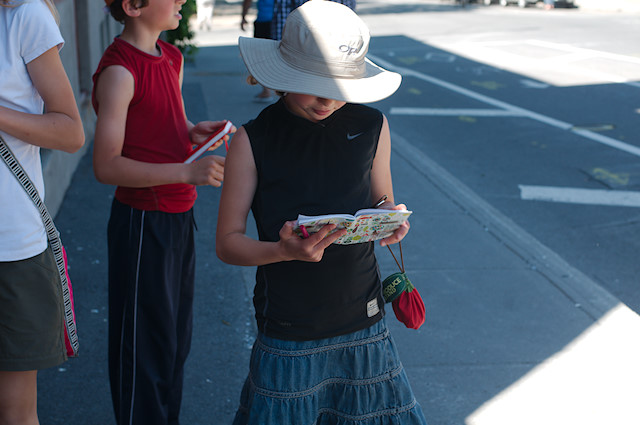
"Fundamentals of Home-Schooling" is full of ideas for implementing a family-values based curriculum. I return to this book again and again for ideas.
It's more than a methods book. It covers the whole scene including an explanation of different philosophies, organizing your homeschool, and getting into college. But I think the book's best content is the many methods and out-of-the-box ideas it shares for creating an inspiring home learning environment.
Since it's now out of the print you might look for it at Abe books.
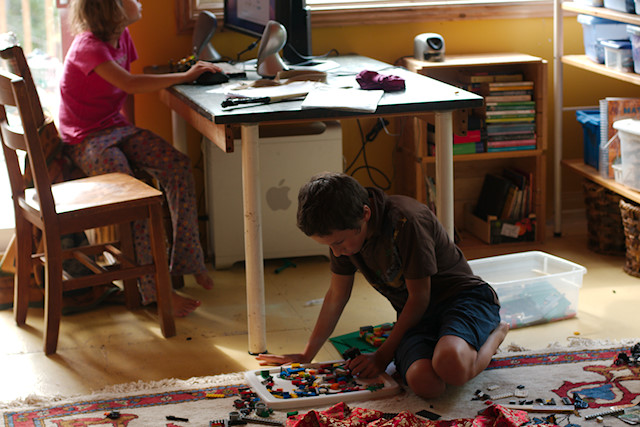
Where do you start?
Most people start their home education journey at the methods. They don't want textbooks so they use living books. They don't want exams so they use portfolios. Etc.
Methods is the easiest point of entry for most people because developing a philosophy of education takes a bit of time (it doesn't happen overnight) and being clear on your values.
Likewise, creating your own curriculum from this philosophy is more work than grabbing something ready-made. But the work is worth it because you will be really clear on the why and the what of your homeschool. And this clarity will bring you more confidence in living the how, which are your methods.
And if you find an educational system out there that lines up with your values and a curriculum that helps you live those values, then by all means use it.
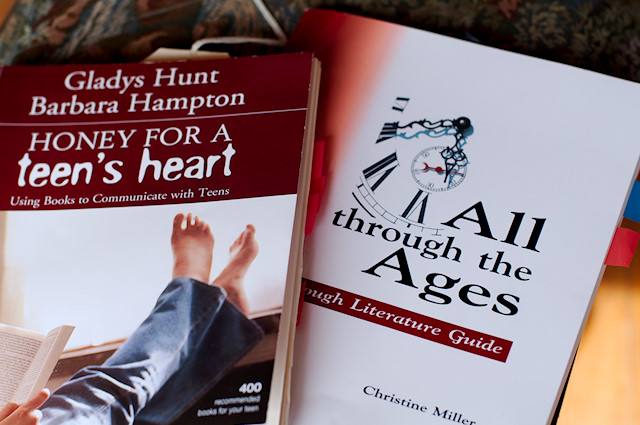
But most homeschool families find that picking and choosing, cobbling together their own philosophy and curriculum (which may rely heavily on someone else's vision but still be inline with their own) is the best option for their homeschool path. When it comes to homeschooling, one size truly does not fit all.
Wherever you are, start there.
If a discussion of philosophy and curriculum makes your eyes glaze over because you just want to get your hands dirty then do that. (You're probably a kinesthetic learner.) And then work backwards from there.
The methods we choose speak a lot about our educational philosophy. You'll always be tweaking and adjusting as you go anyway. Just start.
My own homeschool journey in defining philosophy, creating curriculum and employing methods has gone something like this:
- I had a few ideas about philosophy, largely untried and untested personally, though observed elsewhere.
- I was attracted to certain methods and wary of others. Some means of homeschooling just seemed more enjoyable to me, based on my wiring, my children's wiring, and our family dynamic. I chose the joy route in homeschooling because I wanted our days together to be enjoyable and lovely. That's the life I want to live.
- I created a (very) basic elementary curriculum that was inline with our philosophy and educational objectives and used the methods I was most attracted to and saw as being most enjoyable (for me and the kids). I.e.: very relaxed, play, nature and reading-based elementary years.
- As we homeschooled through elementary and I was exposed to more ideas, I refined and honed our philosophy, grounded in real-life experience but still aiming for our ideals.
- I tweaked our curriculum based on this.
- As we entered the middle years my children expressed their needs for more challenging learning facilitated by different methods. ("Mom, I need more than stories on the couch.") And our lifestyle changed. Dad was now at home full-time.
- The values and philosophy stayed the same, new pieces were added to the curriculum and new methods were employed - lessons, mentors, in-depth projects, etc. This included trying new things to help our son learn to read.
- We entered the transition to scholar and scholar years (we get to do this 3 times with 3 children) and we see how close we are to, or how far we are from, actually meeting our objectives (scary).
- For our scholar, we recently overhauled the curriculum to account for her explicit goals and objectives. We always consider our student's goals and objectives in making the curriculum, but as our children grow they become clearer on their own path and their input becomes more important in curriculum development.
- Our high schooler largely chooses her own methods, based on her needs and learning preferences. She uses the methods most enjoyable for her, since the learning is completely hers. I.e.: I don't have to enjoy the chosen method, I'm not the one doing it!
In the introduction to this post I said that, "My job as as my kids' parent, teacher, mentor, and facilitator is to motivate and inspire interest in these subjects."
The subjects are those of our curriculum. And how do I inspire interest in those subjects? In large part through the methods I use (or don't use).
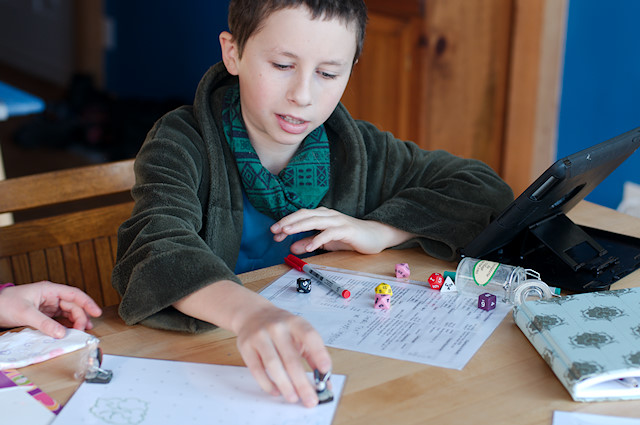
And that's all I have to say. For now.
I hope to expand on projects, as a learning method, in my upcoming posts. This method in particular can completely encompass all the other methods I've listed and is a very effective means of family values driven, interest-led and self-directed education.
This method is the predominant means of study being used by our scholar phase student. And I would love to share more of this with you... later.
Filed Under
Resource Library
-

Joan Rodriguez on Sept. 25, 2013, 1:07 a.m.
I also love this!!
Since I read your blog, I have learned a lot about the true meaning of education. We (my daughter and I, daily followers!) are very grateful for your wonderful work and dedication!
Many blessings for you.
-

jacinda on Sept. 25, 2013, 11:51 a.m.
Wow, such a substantial post with such well-thought out pedogogy here. Similar reasons why I don't feel comfortable calling myself an "unschooler" although a lot of days may look like what others may perceive as unschoolish. I feel the same irritation when people write that they will unschool over the holidays.
-

Shannon on Sept. 25, 2013, 12:53 p.m.
I've been meaning to email you for sometime now to say this... it has been a joy to watch you blossom here at FIMBY as a writer over the years. I feel like you've really come into your own here and your writing reflects such a genuine voice.
I also really appreciate the guidance as a homeschooler to some very littles. I've struggled to nail down exactly what our philosophy is in home education, but I think it heavily overlaps with yours in many ways.
Thanks for sharing the excellent writing and wisdom with all of us.
-

renee on Sept. 25, 2013, 2:31 p.m.
Oh Shannon, Thank you. I have watched you also come into your own as a homesteader and someone who really lives the talk. I appreciate that about you.
I have felt a definite coming into my own here at FIMBY and I seem to catapult my growth each time I open up more of my heart - to share and receive love - and reject the fear that is alwasy trying to bind that freedom.
Each time I make a stand in my life and in my writing for freedom I seem to hit another level in my writing (once I push through the fear). Freedom to be myself. Freedom in our homeschooling. Freedom to build our livelihood the way we see fit. Freedom to follow Damien, all of it. Each time I say yes to this and put fear in it's place I feel released in my writing.
Thank you for your encouragement.
xo, REnee
-
-

Alaina on Sept. 25, 2013, 6:54 p.m.
This is very interesting. I am still working things out for us.
What is that first photo of the pink and purple shapes and the pictures? It looks like something where you try to create the photos with the shapes. I forget what it is called, but I have seen this with plastic patten blocks. However I don't really want to buy the plastic pattern blocks. Did you make these yourself instead? Where did you find out about how to do this?
-

renee on Sept. 25, 2013, 8:51 p.m.
Tangrams. We googled and found tangram patterns and puzzles online. We did that nearly 2 years ago now. Laurent was amazing at making shapes out of tangrams. I'm pretty pathetic at it. I just can't seem to see the shapes in the big shape. It's a great math activity.
-
-

Catherine Forest on Sept. 25, 2013, 10:43 p.m.
I love this post Renee! I love when you say: What looks loosey-goosey from the outside - a household of people following interests and passions, spending their time in the most enjoyable way they possibly can - is actually very intentional and thought out. I find that to be very true for us too.
I am very wary of labels. I think the explanation you provided of unschooling is very true (most unschoolers needing to call themselves radical unschoolers because of people saying they unschool in the afternoon... !). However, as you said, our methods change as we adjust to our children's needs and this is the beauty of it all. The heart of our philosophy. Sticking to a label or a method can be dangerous because the idea of that method can become more important than the child's need.
-

Jess on Sept. 26, 2013, 5:59 p.m.
Renee! Thank you for this well thought out and well written post! Sometimes I feel it's hard to explain the way we homeschool to others who want to label the way we do things. We're often asked if we are unschoolers? Classical educaters? Ecclectic Learners? Charlotte Mason. . . you know the game. Reading your blog over the past few years has helped give me confindence in the way we do things in our home. It has helped to know that we are not alone and also that it's possible to keep going. People who like to label us as unschoolers often throw in the statement that "it'll work for the first few years, but after that you'll have to learn how to get to the 'real work'", as if to discourage or patronize our methods. Being an INFP and not quick with my words, I've never known how to respond to that. Thank you so much for being authentic and sharing your experiences. Your posts have sometimes been the words in the back of my mind that keep me going when I'm deep in the trenches of homeschooling.
-

renee on Sept. 26, 2013, 7:33 p.m.
I get so riled by patronizing comments. But I do my best to just smile at most of them. The "you'll see" and the "just wait"s. The proof is in the pudding. The problem is that real education and learning, not just learning to pass a test and/or make your teachers happy, takes time. And there's a lot bubbling beneath the surface. And that type of learning is not always measureable by easy metrics like a multiple choice exam or true/false statements. Keep on carrying on and thanks for sharing your thoughts with me.
-
You can subscribe to comments on this article using this form.
If you have already commented on this article, you do not need to do this, as you were automatically subscribed.






Amanda on Sept. 25, 2013, midnight
I love this post, and I love that you're just a couple years ahead of us, age-wise, so that I can learn from what has worked for you! Every time I read one of these posts, I get inspired and breathe a sigh of relief at the same time. So nice to know it's working for you, gives me hope it will continue to work for us. And sharing a tasty meal is pretty much the perfect analogy! Thanks for this great post and I look forward to more in the series! Projects, indeed! I've been searching for the best way for us to take history further, as the boys love American History, but I get tired of just reading all the time, and am not sure the best way to facilitate project work. By comparison, science project work seems so easy and straightforward!
Anyhow, I feel like I'm rambling now, but thank you for this awesome post!
Sarah m on Sept. 25, 2013, 3:17 a.m.
I agree with Amanda. I love reading your wordy homeschooling posts like this that are equal parts encouragement and joyful living alongside the practical everyday. It helps me hone down my own intentions with homeschooling and think about things I haven't thought of yet, or wouldn't have considered before.
I also really enjoyed your bit about the definition of unschooling and your own family's freedom education. I liked learning about your family's philosophy & ideas. I would have lumped you in with the unschoolers, because I had no other adequate 'box'. Now I know a bit about the differences.
Sarah M